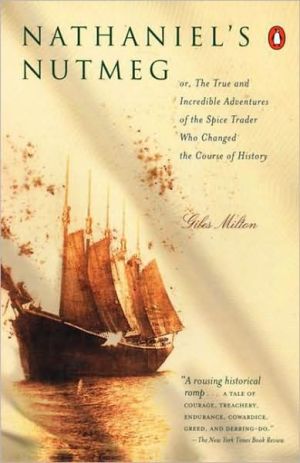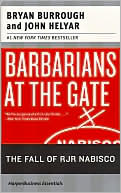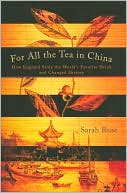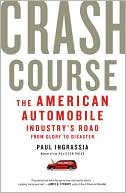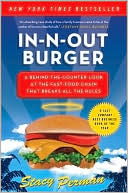Nathaniel's Nutmeg: Or, the True and Incredible Adventures of the Spice Trader Who Changed the Course of History
The tiny island of Run is an insignificant speck in the middle of the Indonesian archipelago—remote, tranquil, and now largely ignored. At the beginning of the seventeenth century, however, Run's harvest of nutmeg turned it into the most lucrative of the Spice Islands, precipitating a fierce and bloody battle between the all-powerful Dutch East India Company and a small band of ragtag British adventurers led by the intrepid Nathaniel Courthope. The outcome of the fighting was one of the most...
Search in google:
The tiny island of Run is an insignificant speck in the middle of the Indonesian archipelago--remote, tranquil, and now largely ignored. At the beginning of the seventeenth century, however, Run's harvest of nutmeg turned it into the most lucrative of the Spice Islands, precipitating a fierce and bloody battle between the all-powerful Dutch East India Company and a small band of ragtag British adventurers led by the intrepid Nathaniel Courthope. The outcome of the fighting was one of the most spectacular deals in history: Britain ceded Run to Holland, but in return was given another small island, Manhattan.A brilliant adventure story of unthinkable hardship and savagery, the navigation of uncharted waters, and the exploitation of new worlds, Nathaniel's Nutmeg is a remarkable chapter in the history of the colonial powers."An exciting account of the dangerous voyages, bizarre transactions and desperate battles of the Spice Wars."--The Washington Post"Fascinating . . . an epic tale, told superbly . . . There is plenty of gore, chance, and piracy to the story."--The Wall Street Journal"A rousing historical romp. . . a tale of courage, treachery, endurance, cowardice, greed and derring-do."--The New York Times Book ReviewGiles Milton is the author of The Riddle and the Knight, a critically acclaimed history of the explorer Sir John Mandeville.
Nathaniel's Nutmeg\ Or, the True and Incredible Adventure of the Spice Trader Who Changed the Course of History \ \ By Giles Milton \ Penguin Books\ Copyright © 2000 Giles Milton\ All right reserved.\ ISBN: 0140292608 \ \ \ \ \ Chapter One\ \ \ \ Arctic\ Whirlwinds\ \ \ It was the look-out who saw them first. Two crippled vessels, rotting and abandoned, lay at anchor close to the shoreline. Their hulls were splintered and twisted, their sails in tatters and their crew apparently long since dead. But it was not a tropical reef that had wrecked the ships and nor was it malaria that had killed the crew. England's maiden expedition to the Spice Islands had come to grief in the ice-bound waters of the Arctic.\ The historic 1553 voyage was the brainchild of a newly founded organisation known as the Mystery, Company and Fellowship of Merchant Adventurers for the Discovery of Unknown Lands. So impatient were these merchants to enter the spice race — yet so unprepared for the risks and dangers — that they allowed enthusiasm to overrule practicalities and long before the ships had left port a catalogue of errors threatened to jeopardise their mission. The choice of expedition leader, or 'pilot-general', was sensible enough. Richard Chancellor was 'a man of great estimation' who had gained some experience of seafaring in his formative years. His adoptive father, Henry Sidney, so eulogised his young charge when presented to the Company that the merchant adventurers thought they had a new Magellan in their midst. Sidney explained that it was Chancellor's 'good parts of wit' that made him so invaluable and, never shy to blow his own trumpet, added, 'I rejoice in myself that I have nourished and maintained that wit.'\ When a doubting merchant tackled Sidney on his enthusiasm for being separated from Chancellor the old man had a ready answer. 'I do now part with Chancellor not because I make little reckoning of the man, or because his maintenance is burdenous and chargeable unto me. You know the man by report, I by experience; you by words, I by deeds; you by speech and company, but I by the daily trial of his life.'\ Sidney's rhetoric won the day and Chancellor was promptly given command of the Edward Bonaventure, the largest of the expedition's three ships. The governors then turned to choosing a captain for the expedition's other large ship, the Bona Esperanza. For reasons that remain obscure they plumped for Sir Hugh Willoughby, a 'goodly personage' according to the records, but one who had absolutely no knowledge of navigation. Such a man would have been a risk for the short hop across the English Channel; to despatch him to the uttermost ends of the earth was to court disaster.\ When it came to deciding the passage to the Spice Islands the merchant adventurers were most insistent. Although they had watched the Spanish and Portuguese successfully sail both east and west to the East Indies, they plumped for an altogether more eccentric option. Their ships, it was decided, would head due north; a route that would shave more than two thousand miles off the long voyage to the Spice Islands. It would have the added benefit of avoiding conflict with the Portuguese who had been sailing the eastern route for almost a century and had established fortified bastions in every port. There was also the question of illness and climate to consider. English mariners had seen the Portuguese ships return home with their crews decimated by dysentery and typhoid, often contracted in the tropical climes of the Indian Ocean. At least one man in five could expect death on the long voyage to the East but that number was frequently much higher and often entire ships had to be abandoned due to a shortage of crew. Since the Portuguese were acclimatised by birth to a hot climate men questioned how English sailors, brought up on the frosty fringes of northern Europe, could hope to return in rude health.\ The expedition ran into trouble before it even set sail. During delays at Harwich, it was discovered that a large part of the provisions was already rotten, while the wine casks had been so badly assembled that the wine was leaking freely though the joints in the wood. But with the wind in their favour the captains decided there was no time to restock the ships and the expedition set sail on 23 June 1553.\ So long as the vessels stuck together under the capable direction of Richard Chancellor they were unlikely to run into trouble. But as they rounded the rocky shores of northern Norway, 'there came such flows of winde and terrible whirlewinds' that Willoughby's ship was blown off course. Chancellor had planned for such an eventuality, suggesting that the ships regroup at Vardohuus, a small island in the Barents Sea. He waited for seven days but, hearing nothing of either the Bona Esperanza or the Confidentia, the third ship of the fleet, he pushed on eastwards towards the White Sea.\ The other two vessels had also survived the storm. After riding out the gale, Sir Hugh re-established contact with the Confidentia and both headed towards the coastline. Here Willoughby's inexperience began to tell. He sounded the sea floor, pored over charts and scratched his head before concluding that 'the land lay not as the globe made mention.' Failing to locate Vardohuus's or Chancellor's vessel, he decided to press on with the expedition without the flagship.\ On 14 August 1553, he 'descried land', apparently uninhabited, at 72 degrees latitude but failed to reach it due to the quantity of ice in the water. If this reading is correct, his ship must have reached the barren islands of Novaya Zemlya which lie, remote and isolated, in the Barents Sea. From here he appears to have sailed south-east, then north-west, then south-west, then north-east. The ignorance of Willoughby and his men is staggering, for their course, more than three hundred miles inside the Arctic Circle, must have taken them in a giant arc through a dangerous sea littered with melting pack-ice. On 14 September, they again sighted land and shortly afterwards 'sailed into a faire bay' somewhere close to the present border between Finland and Russia. Willoughby's men were cheered by the sight of 'very many seal fishes, and other great fishes; and upon the main we saw beares, great deere, foxes with divers strange beasts'. They planned at first to spend a week here but 'seeing the yeare far spent, and also very evill weather, as frost, snow, and haile', they decided to winter in the bay.\ The expedition's directors in London must by now have hoped that their ships had found the North-East Passage, broken through it, and be well on their way to the Spice Islands. But instead of balmy evenings and gently swaying palm trees, Willoughby and his men had met with freezing fog, impenetrable ice, and the realisation that London's merchants had made a terrible mistake when they chose the route over the North Pole. Those merchants had vociferously defended their decision, presenting logical and compelling arguments to support their theories. As far back as the year 1527, Robert Thorne, an English trader living in Seville, had written to King Henry VIII with the exciting (and highly secret) news that the Spice Islands could be reached by way of the North Pole: 'I know it is my bounden duty to manifest this secret unto your Grace,' he wrote, 'which hitherto, as I suppose, hath beene hid.' The King was left in no doubt that 'by sailing northward and passing the Pole, descending to the Equinoctial line, we shall hit these islands [the Spice Islands], and it should be a much shorter way than either the Spaniards or Portingals have.'\ The more the experts researched the north-eastern route to the Spice Islands the more plausible it proved to be. In an age when men still looked for perfect symmetry on their maps, the northern cape of Norway showed an exact topographical correspondence to the southern cape of Africa. Geographers agreed that this was indeed good news; the chilly northern land mass must surely be a second Cape of Good Hope. The writings of the ancients also lent credence to the idea of reaching the East Indies by a northerly route. Pliny the Elder had written of a circular sea at the top of the globe and a land called Tabis penetrating into the far north. To the east of Tabis there was said to be an opening which connected the Polar Sea to the warm waters of the Indian Ocean.\ Such arguments were cold comfort to Willoughby and his men, stuck fast in an expanse of ice. The bay in which they had chosen to winter soon transformed itself into a desolate wilderness; fishing proved impossible due to the thickness of the ice and the wildlife disappeared with the first snows. Even the birds, aware of the onslaught of winter, migrated to warmer climes. Soon the ice floes had trapped, then crushed, the ships and there was no escape. With his crew growing hungrier by the day, Willoughby sent out search parties to look for food, for people, for help. 'We sent out three men south-south-west to search if they could find people,' wrote Sir Hugh, 'but [they] could find none.' Next he sent a party westwards, 'which also returned without finding any people'. A final team confirmed what Willoughby had feared — that they were imprisoned in an uninhabited wilderness.\ More than five years was to pass before a search ship from England finally discovered what had happened to the Bona Esperanza and Confidentia. Sailing into the bay where Willoughby had chosen to winter, the would-be rescuers stumbled across the ghostly and rotting hulks of the two ships — ships which had ended their days as charnel houses. The crew's final grim months remain a mystery, for Willoughby, racked by hunger, stopped recording daily entries in his ship's log. All that is certain is that he and his crew survived much of the winter, for the rescue party found wills dated January 1554, a full four months after the vessels had entered the bay.\ The final, macabre twist in the tale was recorded by Giovanni Michiel, the Venetian ambassador to Moscow. The search party, he wrote, 'has returned safe, bringing with them the two vessels of the first voyage, having found them on the Muscovite coast with the men on board all frozen. And they [the rescuers] narrate strange things about the mode in which they were frozen, pen still in hand, and the paper before them, others at tables, platter in hand and spoon in mouth; others opening a locker, and others in various postures, like statues, as if they had been adjusted and placed in those attitudes.'\ While Willoughby and his men froze to death, Richard Chancellor had fared rather better. Relying on the wit that had so enamoured him to his adoptive father, he quickly foresaw the danger of Arctic pack-ice. Dropping anchor in the White Sea close to present-day Archangel, he abandoned ship and trudged his way overland to Moscow. At first he was disappointed in what he found. The city, he thought, was 'very rude' and the houses 'all of timber'. Even the imperial palace was disappointing — 'rather low' and with 'small windows' it was 'much like the old buildings of England'. But Chancellor soon changed his tune when confronted with the barbaric splendour of Ivan the Terrible's court. Ivan greeted him in 'a long garment of beaten golde, with an imperial crowne upon his head and staffe of cristall and golde in his right hand'. The emperor's conduct was as majestic as it was awe-inspiring: at a courtly banquet he 'sent to every man a great sliver of bread, and the bearer called the party so sent to by his name aloud, and said, Ivan Vasilivich, Emperor of Russia and great Duke of Moscova doth reward thee with bread.' Even the wine goblets caught Chancellor's eye — weighing the golden beakers in his hand he declared they were 'very massie' and better than anything he had seen in England.\ The time spent in Moscow was one of endless pleasure for Chancellor's crew. Many had expected their journey to end in disaster or death but instead they were living it up in the bejewelled pavilion of the Emperor of Russia. Chancellor was no less impressed: 'I have seen the King's majesties of England and the French King's pavilion,' he wrote, 'but none are like this.'\ After lengthy negotiations, Ivan sent the English commander back to England with a letter conferring trading privileges upon a group of merchants in London. In doing so he had unwittingly laid the foundations of the Muscovy Company, a precursor to the East India Company.\ Of the three ships that set sail for the Spice Islands not one achieved its goal of locating the elusive North-East Passage. The men who sailed north to escape the tropical diseases of the Indian Ocean little thought they would perish in the sub-zero waters of the Arctic. It would take another four hundred years, and a nuclear-powered submarine, before the northern route to the Pacific would finally be conquered.\ \ \ While London's merchants anxiously awaited news of their historic first voyage to the Spice Islands, many people in the country were left wondering what all the fuss was about. Nutmeg, after all, made for an unpromising luxury. Dry, wrinkled and not much bigger than a garden pea it scarcely had the same appeal as a golden ducat or finely hewn sapphire.\ The doubters were soon to learn that it was of potentially far greater value. London's leading doctors of physic made increasingly extravagant claims as to the efficacy of nutmeg, holding it to cure everything from the plague to the 'blody flux', both of which were regular visitors to the capital, sweeping through its insanitary back streets with devastating effect. One leading authority pronounced that his sweet-smelling pomander, which contained a large quantity of the spice, could even stave off the dreaded 'sweating syckness' that accompanied the 'pestiferous time of the pestilence'. Since this sickness — the plague — was said to kill in just two hours the pomander had to be made with all possible haste. After all, the old patter ran: 'mery at dinner, dead at supper.'\ It was not just life-threatening illnesses that nutmeg was said to cure. A growing interest in the medicinal value of plants had led to an explosion in the number of dietary books and herbals, all of which claimed that nutmeg and other spices were beneficial in combating a host of minor ailments. For chesty coughs, doctors recommended mulled wine suffused with nutmeg. Cloves were said to cure earache, pepper stifled colds, while those embarrassed by trapped wind were recommended to take an extraordinary pot-pourri of fifteen spices including cardamom, cinnamon and nutmeg — a recipe that would have been out of reach of all but the flatulent rich. Spices were even held to revive those who had shuffled off this mortal coil. Ten grams of saffron taken with sweet wine was enough (it was claimed) to bring back the dead. There were not known to be any side-effects.\ One of the more popular books was Andrew Borde's Dyetary of Helth, a guide to good living which earned the author even more fame than his seminal Treatyse upon Beardes. 'Nutmeges,' he wrote in his Dyetary, 'be good for them which have cold in their head and doth comforte the syght and the brain.' His home-produced nutmeg cocktail was said to be extremely efficacious; not only did it cleanse 'the mouthe of the stomacke and the spleen', it was also 'good against the blody flux', a virulent and dangerous strain of dysentery.\ Borde's Dyetary is a curious mixture of herbal and lore. To any gentleman wishing to live a long life he suggests wearing a red petticoat and avoiding 'snaily rooms', while those able to 'rise with mirth' every morning were assured of good health. His suggestion that nutmeg dampens sexual desire had signally failed to work on him, for this celibate former monk died in disgrace. 'Under the colour of virginitie and of wearing a shirt of hair [he kept] three whores at once in his chamber ... to serve not only himself but also help the virgin priests about in the country.' Borde of all people should have kept taking the nutmeg but as he wearily admitted, 'it is hard to get out of the flesh what is bred in the bone.'\ Other authorities, turning Borde's misfortune to good effect, began to claim that far from dampening sexual desire, nutmeg was actually a powerful aphrodisiac. The licentious Charles Sackville, sixth Earl of Dorset, jested that Julius Caesar's libido was so low that even if Cleopatra had used 'nutmeg, mace and ginger' upon her 'Roman swinger' she would have failed to stir his loins. Such ingredients could scarcely have failed to work on his lordship, for he knew to his cost that a spoonful of nutmeg before bedtime could cause no end of sweet but troublesome dreams:\ \ \ Continues... \ \ \ \ Excerpted from Nathaniel's Nutmeg by Giles Milton Copyright © 2000 by Giles Milton. Excerpted by permission.\ All rights reserved. No part of this excerpt may be reproduced or reprinted without permission in writing from the publisher.\ Excerpts are provided by Dial-A-Book Inc. solely for the personal use of visitors to this web site. \ \
Acknowledgments List of Illustrations and Maps Prologue\ 1. Arctic Whirlwinds\ 2. Wonderfully Unwholesome Climes\ 3. Music and Dancing Damsels\ 4. In the Paws of the Lion\ 5. "Admiral, We Are Betrayed!"\ 6. A Rebel at Sea\ 7. The Cannibals' Country\ 8. The Banner of Saint George\ 9. Conflict Between Gentlemen\ 10. Raising the Blood-Flag\ 11. Trial by Fire and Water\ 12. Striking a Deal\ 13. Epilogue\ Bibliography Index
